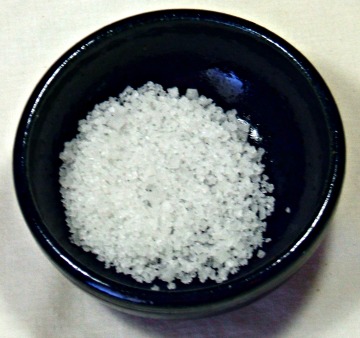Summer gardening is in full swing and gardening tips are flying around the Internet like pollen on the wind. Unfortunately not all these tips are actually good for your garden. The one that is making me crazy is a “natural” weed killer. I’ve even seen this one promoted by organic gardeners. I will concede that it is a natural substance and it does kill weeds. Unfortunately it will kill everything in your garden at the same time.
The offender? Simple cooking salt. Don’t get me wrong, I understand the appeal. It’s already in every kitchen, inexpensive, and easy to use. Mix with water and dump on a weed and it dies. I even did this once when I was a kid, but I was eleven, desperate, and didn’t know any better. Salt works by drawing all the water out of a weed through the roots and leaves. It also gets drawn in through the roots as they absorb water. Once inside the weed the salt prevents the movement of water through the plant to the leaves and the weed dies.
So what is the problem? It works, right? The problem is that salt does not just kill weeds. It kills everything else, too. Any other plant that comes into contact with the salt will die. Beneficial critters like worms or ladybugs also die. So do all the bacteria in the soil that break down nutrients and move oxygen through the soil. The entire soil ecosystem dies with the weed, so nothing will grow in that area.
Advocates of killing weeds with salt say that it will simply be diluted by watering and rain and wash away, so it’s safe. Here’s the thing, salt dissolves in water and moves around in the soil long after it’s no longer visible. Even small amounts of salt will kill the microscopic organisms in the soil. Salt is so effective that the Roman armies would spread salt over enemy fields. Keep in mind this was when marching to war meant every soldier walked. By the time the army got there the local population had not had a decent harvest in years and was starving and weak or had been forced to move on. Also keep in mind that salt was so valuable during the Roman Empire that it was used as currency.
To put the staying power of salt in the soil in context, fertilizers contain trace amounts of salts that can build up in the soil, especially in potted plants where other ways of adding nutrients don’t work well. In order to remove this salt residue potted plants should be leached once or twice a year, depending on how often fertilizers are used. The process is to run water equal to twice the volume of the pot through the soil, letting it drain away completely. So a pot that holds four cups of soil needs eight cups of water run through it to remove the salt residue.
Go look at the size of your garden. Keep in mind that some common garden plants have roots that run two or three feet deep in the soil and tree roots delve much deeper. Now imagine running at least twice that volume of water through the soil deep enough to drain completely. The more salt you use to kill weeds the more water it will take to flush the salt away from the roots. So, barring another Noah era flood, it will take years and years for all that salt to finally wash away. Oh, and from your garden it will end up in streams, lakes, and the water table causing damage to water plants, fish, frogs, and other critters.
Salt, in the garden just say no.

